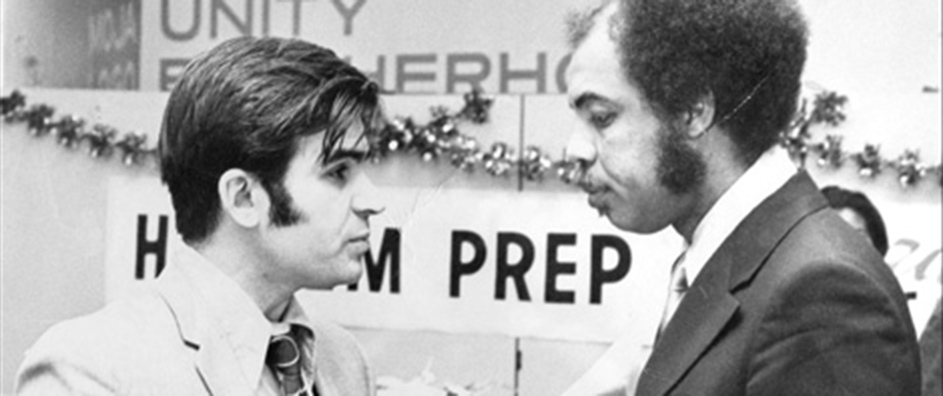Harlem, a vibrantly historical neighborhood in New York City, has often been a crucible of culture, creativity, and spirituality. At the heart of this dynamic milieu, Harlem Prep emerged as a beacon of hope and enlightenment during the tumultuous 1960s and 1970s. This educational institution not only offered academic instruction to high school dropouts but also served as a transformative spiritual bastion—an embodiment of the Bahá’í teachings that promote unity, personal development, and social betterment. The narrative of Harlem Prep is therefore not merely one of educational reform; it is intrinsically woven with profound spiritual significance and philosophical exploration.
To comprehend the spiritual history of Harlem Prep, one must first delve into the essence of Bahá’í teachings. The Bahá’í Faith espouses the profound interconnectedness of humanity, advocating for universal peace and the elevation of human spirit. The teachings emphasize the importance of education as a tool for personal and communal transformation. In a society rife with racial and socio-economic stratifications, Harlem Prep emerged as an educational oasis, illuminating the paths of its students and nurturing their aspirations.
Envision Harlem Prep as a mighty tree, its roots entrenched deep within the rich soil of African American heritage and its branches reaching toward the heavens, aspiring to touch the divine. Each student who walked through its doors constituted a unique leaf on this tree—individuals with diversified backgrounds, ambitions, and struggles, yet all driven by an intrinsic yearning for knowledge and self-actualization. The educators at Harlem Prep, embodying the Bahá’í principles of service and compassion, nurtured these budding aspirations and guided students on their educational journeys.
One of the most compelling aspects of Harlem Prep was its emphasis on holistic education, mirroring the Bahá’í tenet that education should not be confined to academic learning alone. The institution sought to cultivate a fusion of intellectual, moral, and spiritual dimensions, fostering an environment where students could uncover their potential in multiple arenas. Through workshops, arts programs, and communal discussions, students engaged in critical dialogues that explored personal beliefs, ethical dilemmas, and collective aspirations, forming a tapestry of shared experiences and mutual growth.
The ethos of Harlem Prep can be illustrated through the metaphor of a vast ocean—an infinite expanse where each wave represents the diverse thoughts, emotions, and backgrounds of the students. Just as the ocean is constantly in motion, so too was Harlem Prep a dynamic setting, evolving with the changing cultural tides of its time. Students were encouraged to embrace their unique identities while also recognizing their essential connection to others—an embodiment of the Bahá’í principle of the oneness of humanity. This ethos fostered both individuality and communal responsibility, instilling a sense of belonging that empowered students to navigate life’s tumultuous waters with confidence.
As the narrative of Harlem Prep unfolds, it becomes evident that educational institutions can transcend mere academic endeavors to become catalysts for spiritual awakening and social change. Harlem Prep’s holistic approach resonated deeply with the Bahá’í emphasis on social justice, empowering students not only to improve their personal circumstances but also to contribute positively to their communities. Through service initiatives, mentorship programs, and advocacy, students were galvanized to seek justice and equity, echoing the Bahá’í call to action in the face of adversity.
Alongside academic attainment, the nurturing environment of Harlem Prep facilitated introspection and self-discovery. The students engaged with concepts of spirituality and morality, contemplating their roles in a fragmented society. Echoing the Bahá’í assertion of the transformative power of spiritual development, their experiences at Harlem Prep catalyzed a profound awakening. They learned to transcend the limitations imposed by societal expectations and stereotypes, discovering the innate potential that resides within each individual.
Furthermore, the institution became a sanctuary that fostered friendships and collaborations across cultural divides. This diverse tapestry of relationships emphasized the Bahá’í teaching that unity is not merely the absence of conflict, but a celebration of differences in pursuit of a common goal. The bonds forged within the walls of Harlem Prep manifested in collaborative endeavors that sought to uplift not only individual lives but also the broader community. In essence, Harlem Prep exemplified the confluence of education and spirituality, advocating for a collective ethos that prioritizes social reform and mutual respect.
In retrospect, the narrative of Harlem Prep reflects the profound implications of Bahá’í teachings interwoven with the fabric of society. It stands as a testament to the power of spiritual education in shaping future generations, cultivating individuals who are not only knowledgeable but also imbued with ethical and moral foundations. The lessons learned within its walls continue to resonate, prompting ongoing dialogue about the role of education in addressing social inequities and fostering spiritual evolution.
The untold spiritual history of Harlem Prep offers valuable insights into the transformative power of education steeped in spiritual principles. It invites contemplation on the ways educational institutions can serve as agents of change, igniting the flame of unity, empathy, and social responsibility. As we reflect on the legacy of Harlem Prep, it becomes clear that the threads of its history weave a narrative rich with hope, aspiration, and a relentless pursuit of a more just and equitable society—an enduring reminder that, through education and spiritual growth, we can shape a future that resonates with the harmonious principles of the Bahá’í Faith.
